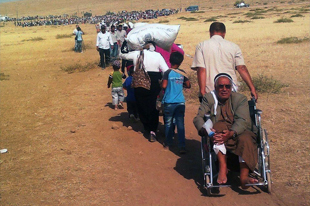 Photo: EC/ECHO (Flickr)
Photo: EC/ECHO (Flickr)
The Islamic State in Iraq and Syria (ISIS) is a clear and present danger to international security. It must be stopped. The question is how. President Obama said there are no military solutions to this crisis, but he has sent U.S. soldiers back to Iraq, launched air strikes there and in Syria, and ordered a doubling of U.S. troop levels in Iraq to 3,100. What’s missing so far from the U.S. response is a coherent plan for using diplomacy and political measures to weaken ISIS and halt the spread of violence in the region.
New posts in the November 2014 issue of Peace Policy:
David Cortright offers a nonmilitary strategy for countering ISIS through diplomatic engagement with Russia and Iran. More »
Ebrahim Moosa investigates the relationship between ISIS and the Nusra Front and the long-term perspectives of major actors in the region. More »
Aysegul Keskin Zeren explains the role of de-Ba’thification in creating a ripe political environment for extremism. More »
About Peace Policy
Peace Policy offers research-based insights, commentary, and solutions to the global challenge of violent conflict. Each issue features the writing of scholars and practitioners who investigate the causes of violent conflict and who seek to contribute to effective solutions and alternatives to the use of force.
Peace Policy is edited by David Cortright, director of policy studies at the Kroc Institute, dcortrig@nd.edu.
Visit the latest issue of Peace Policy at peacepolicy.nd.edu